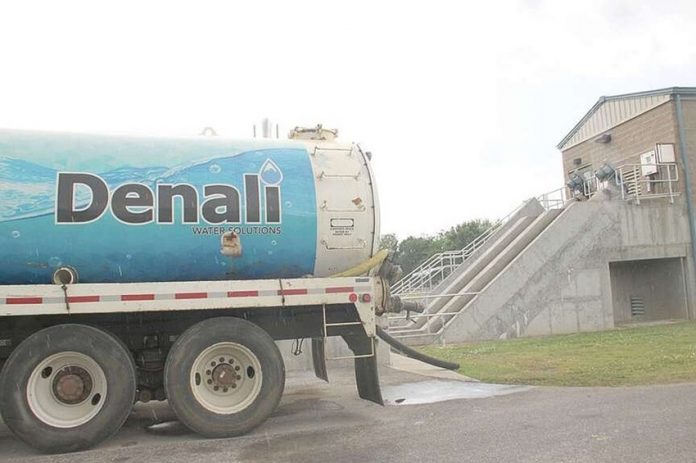Fort Smith, ARK – A lawsuit filed in Crawford County against Denali Water Solutions LLC, a Russellville-based company specializing in organic waste recycling, has grown in scope with the addition of a second defendant and new claims of ongoing environmental harm. The suit, initially filed in October by Bruce Spinas and RCB Management LLC, the operators of River City Bistro in Fort Smith, alleges that Denali’s storage lagoon in the county is emitting noxious fumes that are damaging local property values, causing health problems, and affecting the economy in Crawford and Sebastian counties.
The amended complaint, filed on Monday, now includes SSS of Crawford County, LLC, as a second defendant. According to the documents, SSS has a contractual agreement with Denali in which it is paid for the byproducts and other materials stored in the lagoon. The plaintiffs argue that the storage facility is improperly managed, leading to the release of offensive odors and harmful emissions into the surrounding environment.
The lawsuit is seeking class action status, representing not only the plaintiffs but all individuals, residents, and property owners in Arkansas affected by the alleged emissions from the lagoon. The plaintiffs are demanding that Denali cease operations at the lagoon and are requesting both an injunction to stop further waste disposal and monetary damages for property devaluation, economic losses, emotional distress, and loss of enjoyment of property. Punitive damages are also being sought.
The plaintiffs claim the lagoon contains various industrial byproducts, including food processing waste such as grease, blood, and offal. They contend that the waste is unsuitable for disposal in traditional wastewater systems and is creating dangerous and unpleasant odors described as “manure-like” in nature. Health concerns have also surfaced, with some residents reporting respiratory issues potentially linked to the emissions.
The dispute over the lagoon is not new. In February 2019, Denali responded to complaints from Fort Smith residents about the foul odors emanating from the site, issuing a public apology and assuring local officials, including Fort Smith Mayor George McGill, that the lagoon would be closed and cleaned. At the time, Denali claimed the issue would soon be resolved, with plans to drain and close the lagoons entirely.
However, by August 2024, residents reported a resurgence of the noxious odors, prompting the filing of the amended lawsuit. Plaintiff’s attorney Joey McCutchen, who organized a town hall meeting in Van Buren this week to discuss the case, stated that the company’s failure to keep its promises to local residents was a key factor in the decision to take legal action.
“This storage lagoon has been a public nuisance for years,” McCutchen said. “We’re seeking to hold Denali accountable for the ongoing damage to people’s quality of life and property values. Our clients want this problem fixed once and for all.”
The plaintiffs also voiced concerns about the potential environmental risks posed by the lagoon’s continued operation. In particular, McCutchen cited the risk of pollution to the nearby Arkansas River, which could result from the improper disposal of hazardous materials. Local residents have expressed anxiety about the long-term effects of the contamination on the water supply and surrounding ecosystem.
Denali, which operates waste recycling facilities across the United States, has faced regulatory scrutiny in the past. In November 2023, the U.S. Environmental Protection Agency (EPA) announced that Denali had agreed to pay a civil penalty of more than $600,000 after violating the Clean Water Act in Arizona and California. The EPA alleged that Denali had repeatedly applied sewage sludge to agricultural fields at levels that exceeded crop nitrogen needs, posing risks of groundwater contamination and runoff into nearby water bodies.
Denali has yet to publicly comment on the expanded lawsuit, but the company has previously defended its operations and maintained that its waste management practices comply with state and federal regulations. Despite the company’s claims, the ongoing legal battle highlights growing tensions between local communities and industrial waste disposal operations, particularly in rural areas where environmental concerns are often more pronounced.
As the lawsuit progresses, the plaintiffs are hoping for a resolution that not only stops the emissions from the lagoon but also compensates residents for their losses. In the meantime, residents of Crawford and Sebastian counties continue to deal with the unpleasant and potentially harmful effects of the ongoing odor issue, with no immediate solution in sight.

